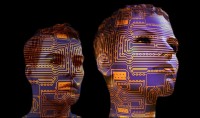Music Industry and Copyright Office Advance Positions on AI
March 22, 2023
The Human Artistry Campaign launched at South by Southwest (SXSW) last week with a goal “to ensure artificial intelligence technologies are developed and used in ways that support human culture and artistry — and not ways that replace or erode it.” With support from over 40 industry organizations — including the Recording Academy, SAG-AFTRA and the Recording Industry Association of America (RIAA) — the coalition outlined principles advocating AI best practices, emphasizing “respect for artists, their work, and their personas; transparency; and adherence to existing law including copyright and intellectual property.”
The full canon is detailed in Variety, which notes that “the campaign urges supporters to sign a petition to advance those principles” on the organization’s website, HumanArtistryCampaign.com.

The screed starts with the heading “core principles for artificial intelligence applications in support of human creativity and accomplishments.” It recognizes that “AI has many valuable uses outside of the creative process,” including those that amplify fan connections and hone recommendations.
Stressing that “use of copyrighted works, and use of the voices and likenesses of professional performers, requires authorization, licensing, and compliance with all relevant state and federal laws,” the document goes on to warn that “governments should not create new copyright or other IP exemptions that allow AI developers to exploit creators without permission or compensation.”
Most importantly, it states what may no longer be so obvious: that “human-created works will continue to play an essential role in our lives.” Along those lines, the U.S. Copyright Office has issued a statement of policy on how it plans to deal with copyrighting works that were created using artificial intelligence published in the Federal Register.
The agency drew a distinction between work that was wholly generated by AI, and output that had human augmentation.
“In February 2023, the Office concluded that a graphic novel comprised of human-authored text combined with images generated by the AI service Midjourney constituted a copyrightable work, but that the individual images themselves could not be protected by copyright,” the Copyright Office wrote in its guidance.
“In making its decision, the Copyright Office committed to upholding the longstanding legal definition that authors of creative works must be human to register works. Because of this, officials confirmed that AI technologies can never be considered authors,” reports Ars Technica.
Significantly, the Copyright Office writes that authors and other creators seeking copyright have a “duty to disclose the inclusion of AI-generated content in a work submitted for registration.”
Specifically, the Office writes that “when registering works, authors must distinguish which content is human-authored and which content is AI-generated. If applicants aren’t sure how to refer to the AI-generated content, the Copyright Office recommends providing a general statement that the work contains AI-generated content. That will prompt the office to follow up to help each author fill in the blanks in an application.”
Basically, the office is “saying it is open to granting ownership to AI-generated work on a ‘case-by-case’ basis,” Mashable writes.
“The U.S. Copyright Office’s new guidance on protections for art, music, and other works created with the assistance of artificial intelligence raises more questions on human involvement that will likely have to be answered by courts,” according to Bloomberg Law.
Related:
AI-“Assisted” Works Are Now Open to Copyright Protection, Raising Questions for Hollywood, The Hollywood Reporter, 3/16/23

No Comments Yet
You can be the first to comment!
Leave a comment
You must be logged in to post a comment.